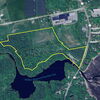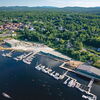Processing Your Payment
Please do not leave this page until complete. This can take a few moments.
- News
-
Editions
View Digital Editions
Biweekly Issues
- November 17,2025
- November 03, 2025
- October 20, 2025
- October 6, 2025
- September 22, 2025
- September 8, 2025
- + More
Special Editions
- Lists
- Viewpoints
-
Our Events
Event Info
Award Honorees
- Calendar
- Biz Marketplace
Bernstein Shur forms team to tackle fast-emerging legal issues involving drones
 Photo / Tim Greenway
Left to right, Philip R. Saucier, shareholder Bernstein Shur, Kelsey Wilcox Libby, associate at Bernstein Shur, Jason Levasseur, drone consultant, and Michael R. Bosse, shareholder Bernstein Shur, in the firm's Portland office.
Photo / Tim Greenway
Left to right, Philip R. Saucier, shareholder Bernstein Shur, Kelsey Wilcox Libby, associate at Bernstein Shur, Jason Levasseur, drone consultant, and Michael R. Bosse, shareholder Bernstein Shur, in the firm's Portland office.
Michael Bosse, leader of Bernstein Shur's construction practice group, came away from the American Bar Association's annual meeting for construction lawyers in Florida this past spring with an unexpected insight. A panel discussion with the intriguing title of “Sticks, Bricks, Bytes and Drones” put those helicopter-like unmanned aircraft on his radar, making the point that the growing use of drones by architects, engineers and construction firms to gather useful data from the air inevitably would be accompanied by new rules and regulations governing their use.
That realization has spurred the creation of Bernstein Shur's “drone team,” a legal group led by Bosse that includes labor and employment lawyer Kelsey Wilcox Libby, municipal and governmental services lawyer Philip Saucier and the firm's information technology specialist Jason Levasseur, who's owned a drone for two years. The legal drone team, which Bosse says might well be the first in Maine, is now publishing regular “drone law boot camp” blog posts on the law firm's website.
“I saw there was going to be a real need for legal expertise on drones, given their rapid proliferation not only in the construction industry but in society in general,” he says of the takeaway message of that ABA panel discussion in Florida. “The need has arrived at our doorstep because the technology of drones is progressing at an unbelievably rapid pace.”
How rapid? Market research by Consumer Electronics Association, the technology trade association representing the $285 billion consumer electronics industry in the United States, forecasts sales in the U.S. market will approach $105 million in 2015, a 52% increase over 2014. Likewise, CEA anticipates unit sales in the U.S. this year to approach 700,000, a 63% increase over 2014.
With that explosion in sales has come a corresponding increase in complaints about civilian drones, among the most worrisome being the Federal Aviation Administration's report this summer of a dramatic increase in pilot reports of encounters with unmanned aircraft over the past year, from a total of 238 sightings in all of 2014, to more than 650 by early August.
Other well-publicized incidents include a drone that flew into power lines in West Hollywood, knocking out power to 700 customers, several occasions in which planes and helicopters fighting wildfires in California this summer were grounded due to unauthorized drones in the air space, and a quadcopter drone crashing on the White House grounds.
Acknowledging it is playing catch-up, the FAA is working feverishly to create a comprehensive regulatory framework governing the non-recreational use of drones weighing up to 55 pounds. Proposed rules released in February envision the possibility of additional, more flexible regulations for recreational drones that weigh less than 4.4 pounds. The new rules are expected to take effect by next June.
In the meantime, an FAA task force faces a Nov. 20 deadline to come up with safety recommendations that are likely to include new registration rules for recreational small drones that could be fast-tracked for implementation before year's end.
The bottom line, as Bosse sees it, is that legal guidelines for the commercial and recreational use of drones are very much in flux and will be for the foreseeable future.
“Right now, and for at least the next several months, we're in a gray area,” he says regarding legal questions that include guidelines governing how registration of small drones might be handled, whether requirements will be retroactive and what will be done with data collected during the registration process.
Drone law boot camp
Given how fluid the FAA's regulatory process is proving to be, Bosse says Bernstein Shur's drone team realized the traditional approach of hosting seminars and publishing legal white papers was ill-suited as a way of educating clients and the general public about all the legal issues involving drones.
That's where the team's online “Drone Law Boot Camp” blog alerts, advertised via Twitter, comes into play.
“I'm a big proponent of using social media,” Bosse says, noting that with the old-school approach a legal practice group might reach 20 people attending its seminar, while a blog post has the potential of reaching hundreds and even thousands of people once it's uploaded to the law firm's website. The team's goal, he says, is to provide at least weekly updates that will try to keep pace with the rapidly evolving legal and regulatory issues surrounding civilian drones.
The team's mix of legal expertise already is evident in the four postings made since the blog's launch in October:
- Libby explains in her Oct. 27 post the likelihood that a new registration system will be implemented in December. She notes that one intent will be “to foster accountability by allowing the authorities to track drones back to their users.”
- Bosse, the go-to authority on the use of drones in the construction and real estate arenas, outlines in his Nov. 2 post the FAA's draft regulations on the commercial use of drones, highlighting the “333 Exemption” that gives the FAA authority to authorize commercial drone uses on a case-by-case basis until the final regulations are in place.
- Saucier, chairman of the firm's municipal and governmental services group and co-chairman of the land use and environmental practice group, brings the issue closer to home with his Nov. 6 post noting that “state and local governments have begun to enact laws and ordinances to regulate the use of drones to protect the privacy and safety of their residents.” He points out to a new law enacted by the Maine Legislature this year with bipartisan support that “prohibits law enforcement agencies from using a weaponized drone, and from using a drone in a criminal investigation without a warrant, with certain exceptions. ”
IT specialist Jason Levasseur brings legitimate street cred to the team. He's owned and operated a drone equipped with a GoPro camera as a serious hobby for two years. As an early adopter, he came into his knowledge by using the Internet and by comparing notes with other drone hobbyists. Admitting that some drone hobbyists are “appalled” by the likelihood of greater regulations being imposed on their drone flying, Levasseur understands the reasons behind the FAA's fast-track push for registration and the increased attention it's paying to both commercial and civilian drone users.
“I welcome having as much information and guidelines that I can get,” he says.
Bosse, Libby and Saucier anticipate their clients have similar feelings, whether it's wondering just how a municipality might prepare for Amazon and Google's announced plans to use drones for E-commerce and package delivery, or the labor and privacy issues that might arise when drones are used to monitor construction jobsites to ensure safe practices or to protect against theft of equipment.
“I like to be part of evolving law in general,” says Saucier. “This happens to be a new and exciting area for us right now. It's really evolving quite rapidly.”
Read more
FAQs about drones
What is an UAS?: It's the acronym for an Unmanned Aircraft System, which includes both the flying part of the system (UAV, or Unmanned Aerial Vehicle, i.e. drone) and the ground control function.
Can I use my UAS, or drone, as part of my commercial operations?: Current FAA laws and regulations generally prohibit the commercial use of drones. Individuals may use a drone for commercial purposes if they've received a Section 333 waiver from the FAA.
What is a Section 333 exemption?: The FAA Modernization and Reform Act of 2012 gives the FAA the ability to issue Section 333 waivers that grant authorization for certain unmanned aircraft to perform commercial operations on a case-by-case basis. The Section 333 waiver process involves the filing of a “petition of exemption” with the FAA.
Do I still have to have a pilot's license if I have the exemption?: Yes. An FAA-issued pilot's license is still required at this time.
Is this regulatory structure going to change?: Almost certainly. In February 2015, the FAA issued a notice of proposed rulemaking on “The Operation and Certification of Small Unmanned Aircraft Systems” (under 55 pounds). Comments have been received and the FAA is in the process of issuing the final rules.
Is insurance available for drone operators?: Yes. Insurance companies offer coverage for drone operators. Call your insurance agent to determine availability and pricing.
Can I be penalized by the FAA?: Yes. Most recently, the FAA announced in an Oct. 6 press release a proposed $1.9 million penalty against a Chicago company that conducted 65 unauthorized drone operations in congested airspace and heavily populated cities, including Chicago and New York City.
Source: Bernstein Shur Drone Team
A brief history of drones
1849: First recorded use of a drone, bombs attached to balloons
1883: Camera attached to a kite with a long string attached to its shutter release
1947: Used for radioactivity monitoring at United States nuclear tests in the Bikini Atoll of the Pacific Ocean
1970s: Compass Cope program (long-endurance reconnaissance drones developed by the U.S. Air Force)
1990s: Predator drone is invented. Initially used by U.S. Air Force and CIA for aerial reconnaissance, it is later modified to be able to fire missiles and other munitions.
2000s: Hobbyists assemble and build custom Quadcopters
2010s: Manufacturers start selling ready-to-fly drones out of the box. With sales in the U.S. market expected to reach 1 million this holiday season, the Federal Aviation Administration is rapidly preparing new regulations to guide the use of drones for recreational and commercial purposes.
Source: Bernstein Shur Drone Team
Drone law boot camp
Mainebiz web partners
Related Content

The Giving Guide
The Giving Guide helps nonprofits have the opportunity to showcase and differentiate their organizations so that businesses better understand how they can contribute to a nonprofit’s mission and work.
Learn More
Work for ME
Work for ME is a workforce development tool to help Maine’s employers target Maine’s emerging workforce. Work for ME highlights each industry, its impact on Maine’s economy, the jobs available to entry-level workers, the training and education needed to get a career started.
Learn More
Groundbreaking Maine
Whether you’re a developer, financer, architect, or industry enthusiast, Groundbreaking Maine is crafted to be your go-to source for valuable insights in Maine’s real estate and construction community.
Learn more-
The Giving Guide
The Giving Guide helps nonprofits have the opportunity to showcase and differentiate their organizations so that businesses better understand how they can contribute to a nonprofit’s mission and work.
-
Work for ME
Work for ME is a workforce development tool to help Maine’s employers target Maine’s emerging workforce. Work for ME highlights each industry, its impact on Maine’s economy, the jobs available to entry-level workers, the training and education needed to get a career started.
-
Groundbreaking Maine
Whether you’re a developer, financer, architect, or industry enthusiast, Groundbreaking Maine is crafted to be your go-to source for valuable insights in Maine’s real estate and construction community.
ABOUT
NEW ENGLAND BUSINESS MEDIA SITES
No articles left
Get access now
In order to use this feature, we need some information from you. You can also login or register for a free account.
By clicking submit you are agreeing to our cookie usage and Privacy Policy
Already have an account? Login
Already have an account? Login
Want to create an account? Register
Get access now
In order to use this feature, we need some information from you. You can also login or register for a free account.
By clicking submit you are agreeing to our cookie usage and Privacy Policy
Already have an account? Login
Already have an account? Login
Want to create an account? Register











Comments